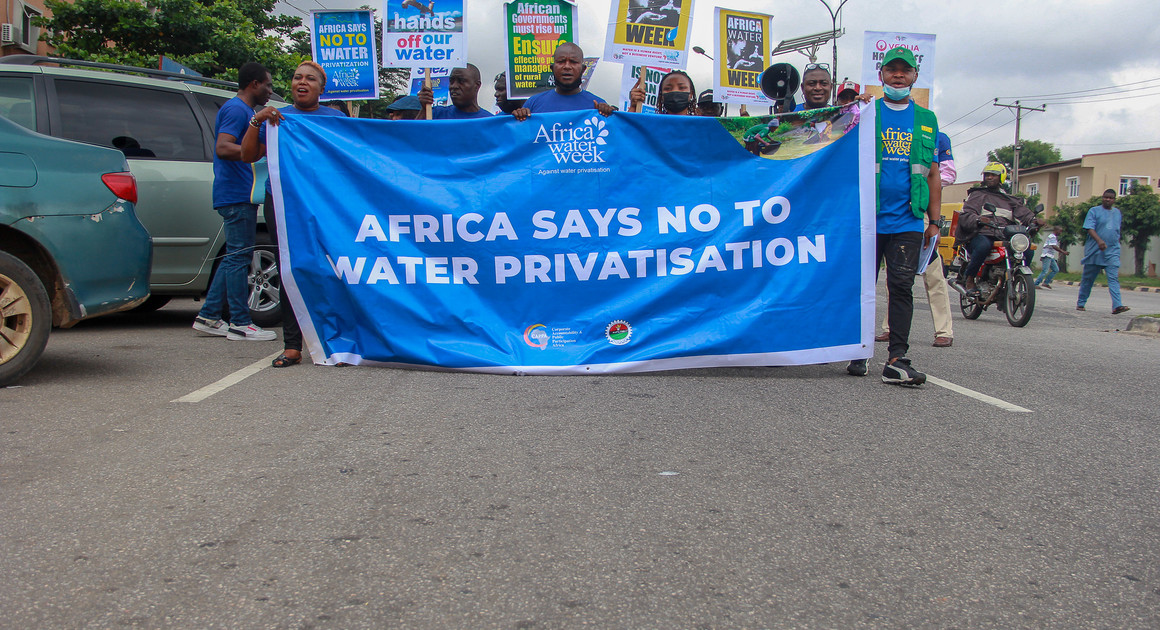
Activities that heralded the Africa Week of Action Against Water Privatisation, an initiative of the Our Water, Our Right African Coalition (OWORAC) on the sidelines of the recent annual meetings of the World Bank and International Monetary Fund (IMF) may have come and gone, but the vital lessons and message should not be lost on policy makers and governments of African countries.
First, the message of water justice as championed by the OWORAC during its week of action, which commenced with a media briefing in Lagos and a virtual training for journalists, promotes equitable and fair access to affordable, safe and clean water. It tackles the disparities in access, distribution and quality of water that disproportionately impact those most in need.
Second, the idea supports the equitable treatment and meaningful participation of all people in water policy and management, and it intersects with social, economic, and environmental justice.
Third, it highlights that everyone should have the chance to prosper without having to deal with water contamination or insecurity since water is a basic human right.
Fourth, governments of the continent must realize that the right to safe and clean drinking water and sanitation as a human right that is essential for the full enjoyment of life and all human rights and that the provision of public water is an obligation, not an option for states.
Most importantly, Cameoun, Nigeria, Gabon, Ghana, Kenya and Mozambique, among others, where privatization models promoted by Veola and Suez were adopted have all failed and as such there is no basis for African countries to continue to embrace privatization. Therefore, Africa should return to deprivatisation and remunicipalisation for social justice, good governance and accountability.
Executive Director of the Corporate Accountability and Public Participation (CAPPA), who spoke on Understanding Water Justice and Privatisation in Africa, drew attention to the fact that whenever and wherever privatization of water has taken place, the people pay with their lives, public health is compromised, children’s education is neglected, while the environment suffers and human existence is threatened.
Citing a 2022 World Health Organisation (WHO) report, he lamented that over 411 million people in Africa lack basic drinking water, while 779 million lack access to basic sanitation services and 839 million lack access to basic hygiene.
“The struggle for water in Africa is understandable. Africa has been at the center of population growth in the world-accounting for the largest relative growth, its population has expanded from 283 million in 1960 to more than 1.5 billion in 2024-and is projected reach 2.5 billion by 2050.
“The absence of clean water is linked to reduced quality of life, malnutrition, disease outbreaks (such as cholera) and high school dropout rates, especially among girls who spend hours fetching water,” he stated.
He said the World Bank and IMF have been promoting privatization and corporate capture, as well as influencing water policies through loans and severe conditionalities by recommending public-private partnerships (PPPs) in African countries driven largely by structural adjustment programs (SAPs).
“Over the last 10 years, the World Bank claimed it has invested approximately $5.2billion in the water sector purportedly to support and strengthen water and sanitation resilience for almost 97 million people in Africa.
“Since 2015, the bank said it invested an average of $900million yearly with Nigeria getting $495million for several water projects; $60 million fund for Lusaka Water and Sewage Sanitation Project and Kenya $124 million for groundwater development,” he stated.
Oluwafemi explained that the impacts of water privatization include rising tariffs and unaffordability; limited public accountability; cherry-picking service areas; undermining of the human right to water; price hikes, service disconnections for non-payment, and inadequate investment in infrastructure lead to worsening access, particularly for vulnerable populations.
“Privatisation typically leads to a loss of one in three water jobs. A survey of 10 privatisation contracts found that after taking over a system, water companies reduced their workforce by 34 percent on average,” he added.
He alerted to privatisation threats on the African continent, saying: “In June 2019, a Viola executive announced the corporation’s goal of increasing revenue in Africa and the Middle East by 50 percent by 2023.
“Similarly, Suez CEO Bertrand Camus projected revenue in the African region as among the strongest in its international markets citing “dynamism for growth.”
He insisted that African governments must rise to uphold the right to water by addressing the issues of water from a human rights-based lens; rejecting all forms of privatization; ensuring democratic participation of local communities; protecting the rights of workers; resisting pressures from international financial corporations and their neo-liberal policies.
“African governments should use the African Union (AU) and other regional bodies to advance public-public participation. They should also ensure public and community-controlled water systems, deprivatisation and remunicipalisation, as well as increased public spending on water infrastructure,” he concluded.
Other papers presented during the virtual media training moderated by Media and Communication Officer of CAPPA, Robert Egbe are: Ethical Reporting and Advocacy Journalism by an award winning journalist, Dr. Olayinka Oyegbile and The Role of Journalists in Exposing Water Inequalities by Esther Omopariola, among others, with a view to empowering journalists on adequate and more robust reporting on water issues in Africa and globally.
The Africa week of action was marked by the Senegalese Water Justice Network (Senegal); Corporate Accountability and Public Participation Africa (Nigeria); Revenue Mobilisation Africa (Ghana); Sundicat Autonome des Travailleurs des Eaux du Senegal (Senegal); Corporate Accountability (USA); Africa Centre for Advocacy (Cameroun) and Biodiversity and Biosafety Association of Kenya (Kenya).
Others are the Institute of Black World (USA); Ecumenical Water Network of Nigeria (Nigeria); Network of Water Rights Initiative (Nigeria); Cheriehomes Global Initiatives (Nigeria); Citizens Free Service Forum (CFSF) and Syndicat National Autonome des Travailleurs de l’Energie de L’Eau ef des Mines du Cameroun (Cameroun).
Earlier, they jointly signed a resolution titled: Water Justice Over Profit: Communities, Civil Society and Trade Unionists from Across Africa Demand Equitable Access to Safe Water, Free from the Dangers of Privatisation.











